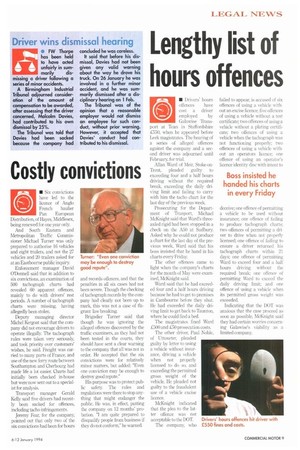Costly convictions
Page 11

If you've noticed an error in this article please click here to report it so we can fix it.
• Six convictions have led to the licence of Anglo French haulier Pan European Distribution, of Hayes. Middlesex, being renewed for one year only.
And South Eastern and Metropolitan Traffic Commissioner Michael Turner was only prepared to authorise 16 vehicles and eight trailers, and not the 27 vehicles and 20 trailers asked for at an Eastbourne public inquiry.
Enforcement manager David O'Donnell said that in addition to six convictions, an examination of 500 tachograph charts had revealed 60 apparent offences, mainly to do with drivers' rest periods,. A number of tachograph charts were missing, having allegedly been stolen.
Deputy managing director Michel Kergoat said that the company did not encourage drivers to operate illegally. The tachograph rules were taken very seriously, and took priority over customers' wishes, he said. Freight was carried to many parts of France, and use of the new ferry route between Southampton and Cherbourg had made life a lot easier. Charts had initially been checked in-house but were now sent out to a specialist for analysis.
Transport manager Gerald Kelly said five drivers had recently been sacked for offences, including tacho infringements.
Jeremy Fear, for the company, pointed out that only two of the six convictions had been for hours and records offences, and that the penalties in all six cases had not been severe. Though the checking of tachograph records by the company had clearly not been up to mark, this was not a case of flagrant law breaking Brigadier Turner said that though he was ignoring the alleged offences discovered by the traffic examiners, as they had not been tested in the courts, they should have sent a clear warning to the company that all was not in order. He accepted that the six convictions were for relatively minor matters, but added: "Even one conviction may be enough to destroy pod repute."
His purpose was to protect public safety. The rules and regulations were there to stop anything that might endanger the public. He was, in effect, putting the company on 12 months' probation. "I am quite prepared to disqualify people from business if they do not conform," he warned.








































































